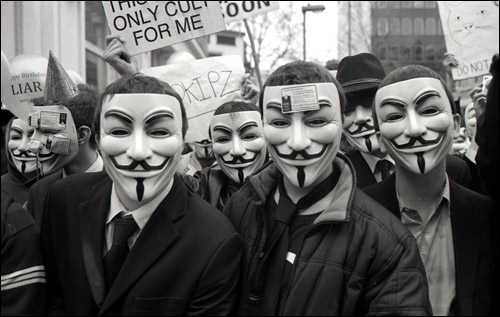
Anonymous wages attack on National Defense Authorization Act, NDAA, re-signed by Obama into law, giving the military extraordinary sweeping powers to detain US citizens indefinitely without trial.
Time magazine called the protester the person of the year for 2011, but if the US government and Obama Administration continue with its campaign against American freedom, defying corruption with demonstration as such will be outlawed in only a matter of time in the USA.
Concerned over how very real the collapse of the US Constitution is because of Congress’ passing of the National Defense Authorization Act, the NDAA, global activists with the online collective Anonymous have proposed a national day of action against the controversial legislation to occur within next month.
Hacktivists had initially proposed a massive campaign against the act for January, but have now moved the protest to launch on February 3.
NDAA lays foundation for targeting political dissenters, activism
The National Defense Authorization Act for Fiscal Year 2012, or NDAA, was recently signed off by US President Barack Obama. Under the legislation, the Department of Defense is guaranteed spending appropriations for a 12-month span. Certain provisions snuck in, however, the US government is granted the powers to indefinitely detain and torture American citizens without charge, essentially creating Guantanamo Prison-style detention possibilities for anyone deemed a threat by American authorities.
US President Barack Obama insists that he will not abide by such provisions, although the laws are still written and approved under his own name. Although he could abide by his word and remove himself from endorsing any of the provisions, the fact that the legislation does still for such enforcement does not negate its existence.
“The statute is particularly dangerous because it has no temporal or geographic limitations, and can be used by Obam and future US presidents to militarily detain people captured far from any battlefield,” stresses American Civil Liberties Union (ACLU) Executive Director Anthony Romero of the dangerous realities promised under NDAA. Even if Barack Obama claims he will not abide by the powers he has now been bestowed with under the legislation, Romero says that US President Obama “will forever be known as the president who signed indefinite detention without charge or trial into law.”
What Obama had promised and what he has done so far
On January 22, 2009, newly inaugurated President Barack H. Obama proudly issued his first three executive orders, one of them, a directive requiring the infamous Guantanamo Bay prison facility to be closed within one year.
Nearly three years later, Guantanamo Bay remains open with prisoners being held without trial, and a new law enacted with the stroke of his pen could mean more American citizens will be joining them soon.
Activists against the legislation have rallied in opposition since it first moved through Congress. Following Obama’s New Year’s Eve signing, however, widespread disbelief and concern has only increased and now Anonymous is urging Americans to take it to the streets before Congress begins to act on the damning bill.
“While we cannot force the American people to protest, we must tell them that this law will trip away any rights they thought they had including but not limited to free speech, free press, free access to information and the right to protest, assemble and bear arms,” recites a digitzed voice in a recent YouTube clip uploaded by an account alleging to be affiliated with the Anonymous collective. The narrator describes that NDAA allows for the government to detain suspects, “even American citizens, without trial” for any allegedly belligerent acts.
Belligerent Act : A Twisted definition in US Policy ?
“What is a belligerent act?” asks the speaker. “Is protesting a belligerent act? Is being Anonymous a belligerent act? This is where we draw the line.”
“This is when we revolt.”
Previously, hacktivists aligned with the Anonymous collective attempted to wage cyber attacks on the creators and signers of NDAA, going after lawmakers involved in the bill by posting private information on the Web.
“No longer will you be able to enslave the people. The whole world will know of your violations against the rights of the citizens you were elected to represent,” read a statement from one Anonymous operative then. In recent weeks, a similar online-organized attack against supporters of the controversial Stop Online Piracy Act, or SOPA, forced in part several major corporations from withdrawing support of the legislation.
[adrotate banner=”36″] Netanyahu’s Residence Targeted in Another Attack
Netanyahu’s Residence Targeted in Another Attack Russia Halts Gas Supplies to Austria, Marking a Shift in European Energy Relations
Russia Halts Gas Supplies to Austria, Marking a Shift in European Energy Relations House of Representatives remains with the Republicans
House of Representatives remains with the Republicans Investigations against Martin Sellner
Investigations against Martin Sellner